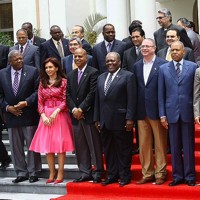The recent collapse of authoritarian regimes in the Middle East and North Africa during the Arab Spring provides a backdrop to reflect on Latin America's democratic transitions from authoritarian rule during the "Third Wave of Democratization" as well as to review the current health of the region's democracies. Compared to the paucity of democracies in Latin America at the start of the Third Wave in the mid-1970s, the near-universal presence of democratic regimes today highlights the tremendous democratic progress made in the region over the past three-dozen years. Nevertheless, within this broader regional success exists considerable country-by-country variation in democratic experience and quality.
This article will first review the stark differences in the foundations upon which the region's Third Wave democracies were constructed, with particular focus on the nature of the democratic transition and prior experience with democratic elections and governance. It will then discuss the evolution of democracy in the region over the past three and a half decades. Next it will examine the considerable variance in the degree of democratic consolidation and democratic quality in the region as of 2012. A final section will draw some general conclusions about some of the most significant factors that drove the democratization of Latin America.
The article will concentrate on the 19 former Spanish and Portuguese colonies of the region -- Argentina, Bolivia, Brazil, Chile, Colombia, Costa Rica, Cuba, the Dominican Republic, Ecuador, El Salvador, Guatemala, Honduras, Mexico, Nicaragua, Panama, Paraguay, Peru, Uruguay and Venezuela -- while excluding a discussion of democratic transitions and democracy in the region's former British, Dutch and French colonies. This latter group is dominated by the dozen ex-British colonies, which with the exception of Guyana have avoided any serious democratic breakdowns since achieving independence between 1962 and 1983, and at present all possess robust democratic systems.

